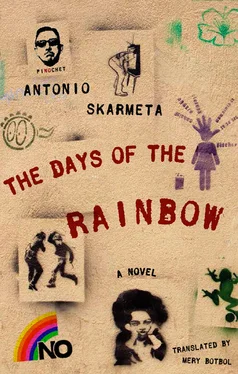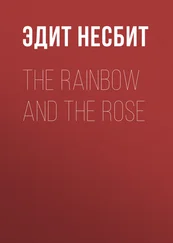But Professor Santos and I had foreseen this situation.
We had even given it a name: We called it the Baroque situation. If they took Daddy prisoner in front of witnesses, that meant they couldn’t make him vanish like they did to other people, people who are put in a bag with stones and are thrown into the ocean from a helicopter. There are thirty-five students in my class and we all saw with our own eyes that they took my father. He says that that’s an optimal situation, because they won’t kill him. In cases like this, he’s protected by the witnesses.
According to the Baroque plan, when they take Daddy prisoner I have to make two phone calls to two numbers I learned by heart, although I don’t know the names of the people who are going to answer. Then I have to keep living a normal life, going home, playing soccer, going to the movies with Patricia Bettini, going to school as usual, and at the end of the month, I have to go to the treasurer’s office to pick up his paycheck.
So when they took Professor Santos, I began to trace circles on a piece of paper while I felt silence growing around me like a spiderweb. I’m sure that my classmates thought that out of sheer instinct I should’ve jumped and defended my old man.
But my father has told me a hundred times already that he isn’t afraid of anything in the world except that something bad happens to me.
And everybody around here knows that a seventeen-year-old boy disappeared months ago and he isn’t back yet.
I have to ignore those looks because I can’t explain to my classmates that I’m applying the Baroque syllogism.
If they had made my father disappear without any witnesses, we would be facing the Barbarian syllogism, and I would’ve probably died already of sadness.
After they took Professor Santos, Inspector Riquelme came and gave us a reading-comprehension exercise.
And when we finally got to recess, I went to the restroom. I didn’t want to talk to anyone. I didn’t want anyone talking to me.

MR. BETTINIdug up a tie from a trunk and knotted it unenthusiastically in front of the mirror. He sent his daughter, Patricia, in a cab to school and asked his wife to go with him up to the gate of the presidential palace. Once there, he kissed her, and after getting out of the car, he gave her the keys to the vehicle, “just in case.”
At five to ten, Adrián Bettini entered the dictatorship’s central headquarters.
The receptionists in the lobby were dressed in fuchsia uniforms, spoke softly, were polite and smelled good.
They took him from one office to another, from one elevator to another, from one officer to another, until finally they made him sit in an office with soft leather armchairs and quiet carpets.
Behind the desk (“behind the desk,” Bettini said to himself, as if he were telling someone the story that he was never going to have the chance to tell), the minister of the interior himself was sitting.
Bettini was about to faint. Dr. Fernández was considered the regime’s toughest man. Only General Pinochet beat him in these matters.
He knew, even in his strict silence, that if he had to speak right at that moment, his voice would come out hoarse.
The minister of the interior smiled at him. “Thank you for coming, Don Adrián. I want to inform you that in two months the government will call a plebiscite. Why are you smiling?”
The man tried to hide the grimace on his lip. Then he closed his hands tightly inside the pockets of his jacket and answered, “A plebiscite like the one in 1980, Mr. Minister?”
“The 1980 plebiscite was not fraudulent. Pinochet won with seventy percent of the votes. But I understand all too well that, in view of such strong evidence, you, being a leftist, would resort to demagogic clichés and accuse us of fraud.”
Bettini brushed off his lapels as if he wanted to remove an ash. Arguing face-to-face with the minister of the interior was making him feel unexpectedly calm. If they were going to kill him or torture him, anytime, whatever he could say would be irrelevant. A sort of sudden suicidal dignity filled his mouth faster than his thoughts.
“I’m sorry if I gave you that impression, Mr. Minister. But people tend to think badly when there are no other legal parties represented in the voting booth, when the ballots are counted only by members of the government, when there is no electoral commission, and when there is no independent press to write about any political opposition. But aside from these tiny details, the plebiscite that Pinochet won back then must have been fair.”
The minister swiveled in his armchair and smiled, showing perfect teeth that made him look younger.
“This time, everything will be done to perfection. We want our October fifth plebiscite to be irreproachable and unimpeachable. Members of the opposition will be allowed to be at the voting tables, there will be delegates of our political enemies working at our computer centers, we won’t ban international election observers, and as of tomorrow, martial law will be lifted throughout the country.”
“Sounds good! And what are we going to vote on?”
“ Yes or No .”
“ Yes or No ?”
“ Yes means that you want Pinochet to stay another eight years as president. No means that you want Pinochet to leave and to have presidential elections, with several candidates to choose from, one year from now.”
“Elections!”
“And that’s not all. Since we want to democratically legitimize Pinochet in the eyes of the entire world, we’re going to allow the opposition to campaign for the No to Pinochet option on TV.”
“On TV!”
The minister offered him a glass of fizzy mineral water.
“I don’t have any champagne here for you to celebrate. But please have this glass of cool water.”
Bettini’s mouth was so dry that he rinsed it discreetly before swallowing.
“Well, Mr. Minister. Congratulations on these democratic outbursts. Can I ask you now why you summoned me?”
The official got up from his armchair with a solemn and indecipherable gesture, and caressed the tassels that adorned the curtains of his large window.
“I know you’re a bitter enemy of our regime,” he told Bettini, with his back to him. “I also know that, on one occasion, some of my men taught you a little lesson.”
“A lesson? What a notable euphemism, Mr. Fernández!”
The minister turned around and waved a finger in front of Bettini’s nose. “For your information, I severely reprimanded them for that.”
“My broken collarbone thanks you. Now, can you tell me what you want from me?”
Fernández brought his hands together and put his fingers over his chin.
“Fifteen years ago I was working as a top executive for Coca-Cola and I got to admire you as our competitor’s advertising agent, when you came up with a commercial for a new soft drink called Betty, which had a funny taste, a bitter flavor. It was very difficult to introduce such a bitter-tasting beverage to the market because back then everybody was used to sweet sodas. Remember?”
“I remember, Mr. Minister.”
“Do you remember the slogan of that successful campaign?”
“Yes. Betty, a bit bitter, like life.”
“Brilliant, Bettini, brilliant!”
“I can’t believe you summoned me just to congratulate me on a slogan I wrote fifteen years ago!”
The minister rubbed his right fist against the palm of his left hand.
“No. But now I have to sell a product that people consider bitter — another eight years of Pinochet.”
Читать дальше












